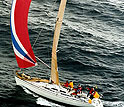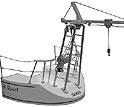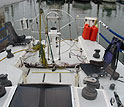News Release 05-116
Ability, Not Disability, at Heart of Yacht Trek
Student projects help physically challenged sailors competitively race across Pacific
July 11, 2005
This material is available primarily for archival purposes. Telephone numbers or other contact information may be out of date; please see current contact information at media contacts.
B-roll available
A crew of six sailors challenged by such physical disabilities as quadriplegia and blindness—and their able-bodied skipper—embarked today on a 2,225-mile competitive race from Calif. to Hawaii, the sailing crucible known as the Transpac.
The boat, a customized 40-foot racing yacht named B'Quest, has been outfitted with specially designed equipment – including secured cockpit seats engineered by college students at San Diego State University (SDSU). The devices will enable every member of the B'Quest crew to compete with able-bodied crews in a field with 75 other vessels.
The 2005 race is the second Transpac for the Challenged America team. More formally known as the Transpacific Yacht Race, the Transpac is one of the oldest ocean races in the world and it is celebrating its centennial this year.
Led by engineering professors Karen May-Newman and Michael Lambert, the SDSU students are part of a long-running NSF program, the Engineering Senior Design Projects for Persons with Disabilities. The program matches collegiate engineers with individuals in their community who are in need of assistive devices that either do not exist or are prohibitively expensive.
"The primary goal of the senior design projects activity," says NSF program director Gilbert Devey, "is to aid a specific individual and give the engineering student a sense of purpose and pride, while helping engineering schools serve the community."
Since its inception in the late 1980s, the senior design projects have helped some 1,200 people of all ages by providing devices as simple as a customized toy or as complex as an apartment wired as a voice-activated home.
B'Quest is the flagship of San Diego-based Challenged America, an organization founded by disabled Vietnam veterans to provide free sailing education and recreation rehabilitation programs to people with and without disabilities from around the world. A gift from a donor who wanted the vessel to be a part of this effort, the B'Quest has competed in many races, crewed by experienced sailors overcoming such obstacles as quadriplegia, paraplegia, neuromuscular disease, blindness and cancer.
The crew worked directly with the students to test and evaluate a number of devices that will be used not only in the Transpac, but will ideally find broader use among other sailors, such as the aging baby boomers. As more retirees continue to sail ever later into life, they are increasingly confronting physical challenges that could be addressed by many of the student-designed devices.
As with most NSF senior design projects carried out on campuses across the country, community members, in this case the crew, approach the students with their needs. The students interacted with their "clients" and professors on the boat and in the laboratory, ultimately designing systems to solve a range of mobility and related problems.
While not all devices designed in the SDSU program will be used on the B'Quest during this year's race, the students gain invaluable knowledge and experience, from product inception to manufacture.
"This kind of project is a great experience for our students," says May-Newman. "They get a complex, practical design challenge, as well as a chance to see the tangible, positive impact their work can have on the lives of others, and even on society in general."
This research was supported by NSF Award #0314095
Undergraduate Design Projects for Developing Assistive Technology for Recreational Applications
http://www.nsf.gov/awardsearch/showAward.do?AwardNumber=0314095
Follow the team throughout the race at http://www.sail-world.com/challengedamerica/.
For general race information, see http://www.transpacificyc.org/05/tp05-news.html
-NSF-
-
Image of the B'Quest as taken from a helicopter by Geri Conser.
Credit and Larger Version -
Crew-member retrieval system designed by SDSU students and professors.
Credit and Larger Version -
This seat is one of the models designed for the B'Quest by SDSU students and professors.
Credit and Larger Version
Media Contacts
Joshua A. Chamot, NSF, (703) 292-7730, email: jchamot@nsf.gov
Gail Strickland, Challenged America, (619) 218-5843, email: gailmakingwaves@yahoo.com
Renee Haines, San Diego State University, (619) 594-4298, email: rhaines@mail.sdsu.edu
Program Contacts
Gilbert Devey, NSF, (703) 292-7943, email: gdevey@nsf.gov
The U.S. National Science Foundation propels the nation forward by advancing fundamental research in all fields of science and engineering. NSF supports research and people by providing facilities, instruments and funding to support their ingenuity and sustain the U.S. as a global leader in research and innovation. With a fiscal year 2023 budget of $9.5 billion, NSF funds reach all 50 states through grants to nearly 2,000 colleges, universities and institutions. Each year, NSF receives more than 40,000 competitive proposals and makes about 11,000 new awards. Those awards include support for cooperative research with industry, Arctic and Antarctic research and operations, and U.S. participation in international scientific efforts.
Connect with us online
NSF website: nsf.gov
NSF News: nsf.gov/news
For News Media: nsf.gov/news/newsroom
Statistics: nsf.gov/statistics/
Awards database: nsf.gov/awardsearch/
Follow us on social
Twitter: twitter.com/NSF
Facebook: facebook.com/US.NSF
Instagram: instagram.com/nsfgov






